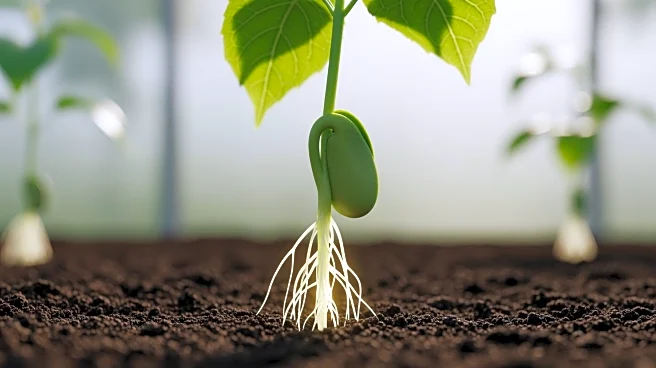What's Happening?
Researchers at Aarhus University, led by Kasper Røjkjær Andersen and Simona Radutoiu, have made significant progress in understanding the genetic mechanisms that could enable crops to self-fertilize. The
study focuses on the symbiotic relationship between certain plants and nitrogen-fixing bacteria, which allows species like peas and clover to thrive without artificial fertilizers. The team identified changes in plant receptors that suppress immune responses, facilitating symbiosis with beneficial bacteria. This discovery could potentially be applied to major cereal crops, reducing the need for synthetic fertilizers and lowering global energy use and CO2 emissions.
Why It's Important?
The ability to develop self-fertilizing crops would revolutionize agriculture, making food production more sustainable and environmentally friendly. It would reduce the reliance on synthetic fertilizers, which are energy-intensive and contribute to greenhouse gas emissions. This breakthrough could lead to significant cost savings for farmers and improve soil health by minimizing chemical inputs. The research also highlights the potential for genetic engineering to enhance crop resilience and productivity, addressing global food security challenges.
What's Next?
The next steps involve transferring the genetic modifications to other crops, such as wheat, barley, and maize, to test their ability to fix nitrogen independently. Researchers will continue to explore the molecular pathways involved in symbiosis, aiming to identify additional genetic keys necessary for widespread application. Collaboration with agricultural stakeholders and policymakers will be crucial to implement these innovations in real-world farming practices.
Beyond the Headlines
This research underscores the ethical considerations of genetic engineering in agriculture, balancing the benefits of increased sustainability with potential ecological impacts. It may also influence cultural perceptions of biotechnology and its role in addressing climate change. The development of self-fertilizing crops could shift agricultural paradigms, promoting regenerative practices and reducing dependency on chemical inputs.









